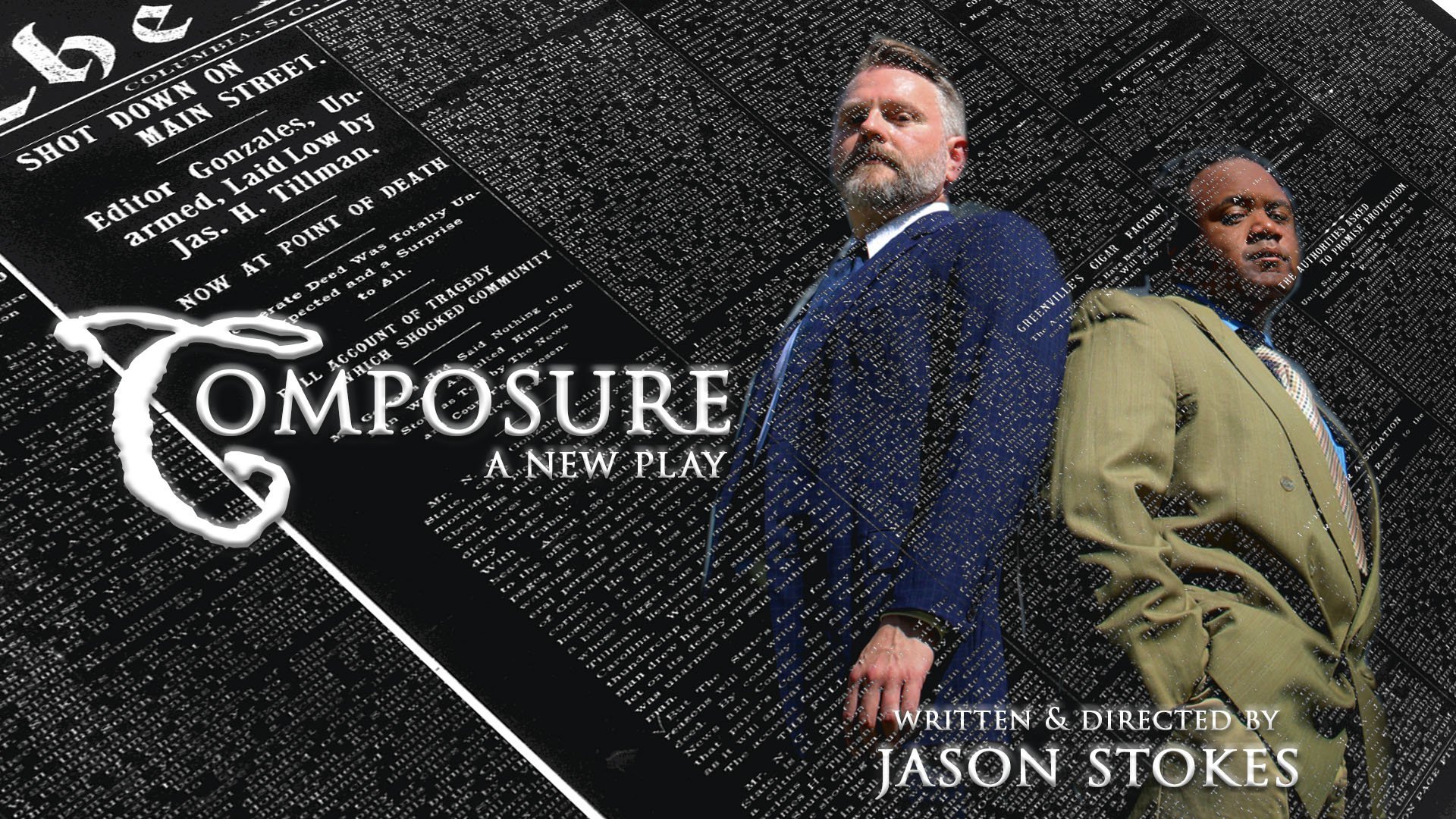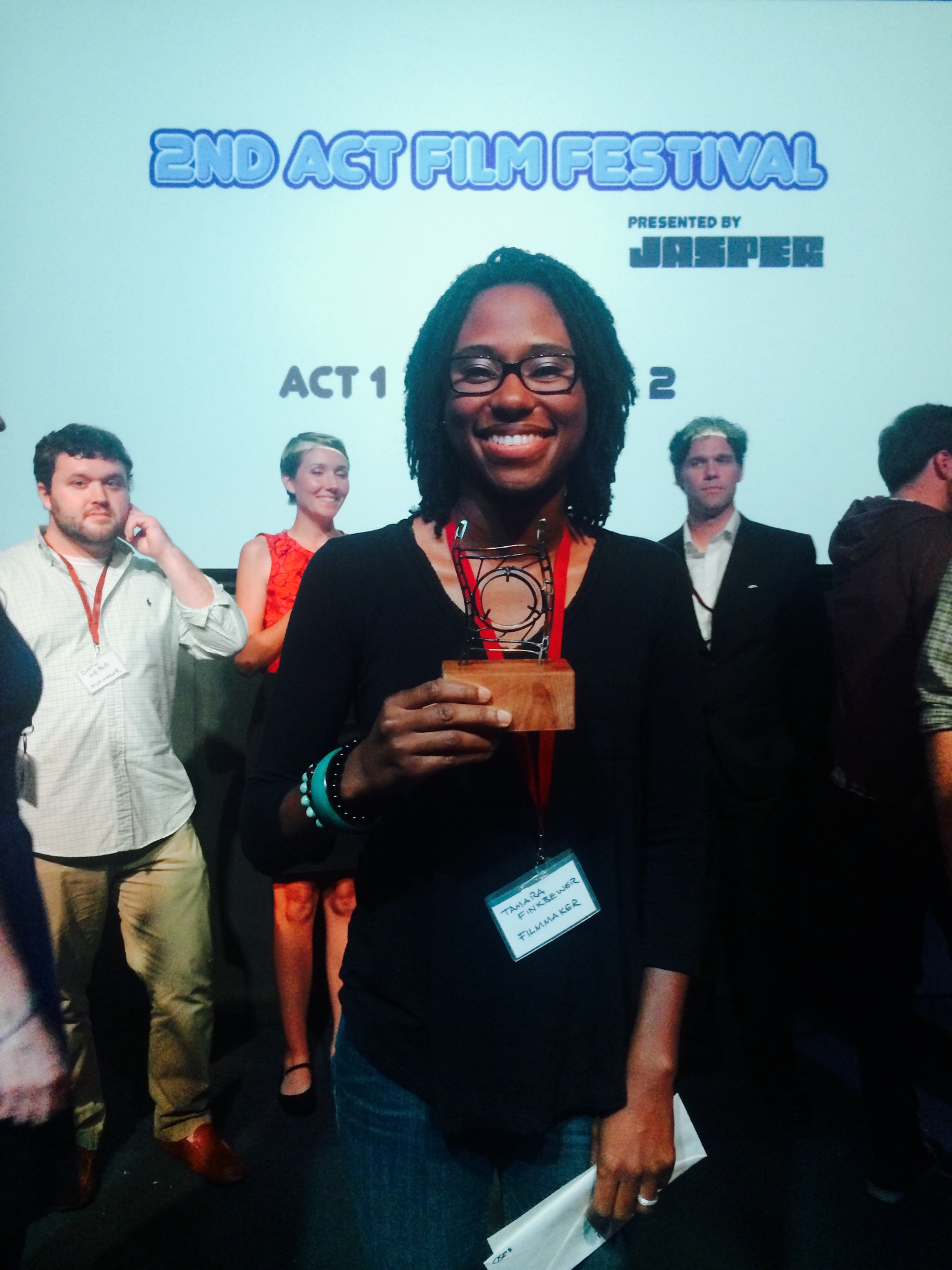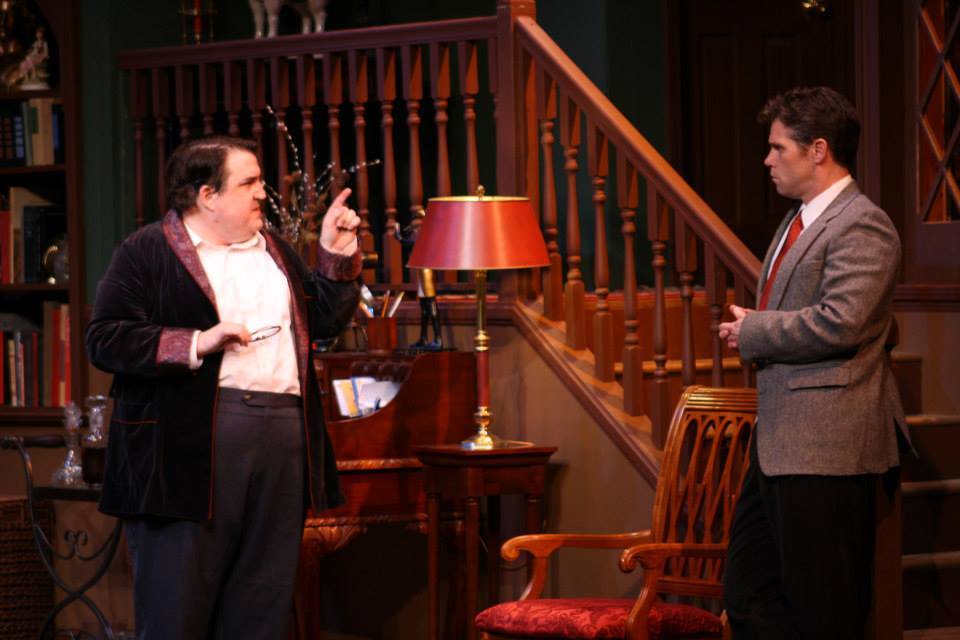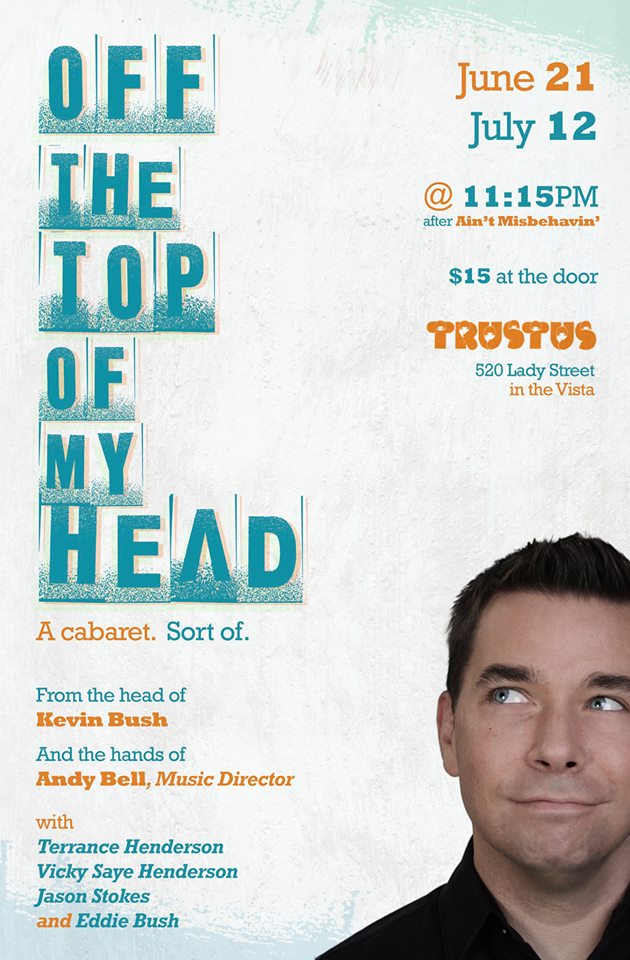This time last year, on a lark, I put together a stream-of-consciousness recollection of some things I had enjoyed on stage over the preceding year. Would you believe - we set a new record for site visits with that blog post! Sure, sure, the site and blog were still young, and most of it was folks logging in to see if they were mentioned or not, but still, it showed everyone involved that there is significant interest in theatre among the greater Columbia arts community. As I wrote at the time, "theatre for me is sometimes not about the final product, but rather individual moments that move me, make me smile, or stay with me long after the show is done." This year I have been fortunate to see most of the shows at the main theatres in downtown Columbia: 7 of 8 done on the Thigpen Mainstage (plus a late-night show) at Trustus, 3 of the 5 done at the Trustus Side Door, 5 of 6 at both Town and Workshop, plus a couple at Columbia Children's Theatre. That's 23 freakin' shows, which sadly means that I didn't have time to see any at the many excellent theatres and venues on campuses and in the suburbs. So with that disclaimer, I give you the best, funniest, and most memorable theatre moments for me from 2012:
- the opening image as the curtain rose in Dirty Rotten Scoundrels at Town Theatre, with dancers frozen in exotic poses. In particular, Haley Sprankle, Grace Fanning and Becky Combs were draped over their partners with extension that went from here to the moon, and it perfectly captured the look and feel of the carefree and free-spirited Riviera setting.
- Doug Gleason in Scoundrels, goofing and camping it up shamelessly, then breaking into song with the voice of an angel, not a buffoon. In my review, I wrote that he reminded me of the young Bill Canaday, a gifted comic actor now happily retired from the state and (at least temporarily) the stage. Several people mentioned to the real Bill that they saw his name in a theatre review, and he laughed and later told me that this was like the actor's nightmare - was he supposed to have been in a show somewhere? Did he miss his entrance?
- Elizabeth Stepp as a huffy, haughty insect, miffed over being shooed away in Pinkalicious at Columbia Children's Theatre. Lindsay Brasington, vamping and cooing for the press as she imagined being the first doctor to diagnose acute "pinkititis." George Dinsmore, dramatically confessing to his wife after all these years, his dark secret that he too secretly had a fondness...for the color ....pink. (At which point Sumner Bender leaned over and whispered to me "But they named their daughter ... Pinkalicious?"
- Shelby Sessler's tour-de-force as three separate and distinct characters in Alfred


Hitchcock’s 39 Steps at Town. Only a couple of weeks after portraying the titular tyke in Pinkalicious above, she played a va-va-voomish German femme fatale, a forlorn Scottish farm wife, and a proper yet spunky yet romantic British lady. As the German she somehow managed to not only play dead, but to feign rigor mortis, stretched out over an armchair... I still don't know how she managed it. As the lady, she and her castmates mimed all the effects to convey a train speeding down the tracks.... and if you looked down, very subtly her hand was fanning the hem of her skirt back and forth to add the effect of wind. Not surprisingly, she was one of three finalists for Jasper Theatre Artist of the Year, and organized the entertainment for the November issue release party at City Art.
- Avery Bateman and Kanika Moore playing multiple roles in Passing Strange at Trustus. Bateman cracked me up as a materialistic princess-type whose life with hero Mario McClean was pre-planned within about 5 seconds; then she and Moore turn up as Dutch girls, then Germans. "Have a conversation vit' ze hand," Moore declares, almost getting American slang right. Even music director Tom Beard got a line in on stage, rising in outrage, when the cynical German nihilist characters dismiss the punk movement as commercialism, to protest "What about The Clash, man???" Also loved the vivid colors that symbolized the free-spirited European setting of Passing Strange, provided via original paintings from ten local artists, and director Chad Henderson's always-moving, never-a-dull-moment, no-one-wasted-on-stage blocking. (And sure enough, Henderson was voted Theatre Artist of the Year by Jasper readers!)
- Randy Strange's lush, opulent, plantation-interior set for Cat on a Hot Tin Roof at Workshop Theatre. There was something to take everyone's breath away in this classic show, from Jason Stokes in a towel, to E.G. Heard (and on alternating nights, Samantha Elkins) in a negligee. Ironically, the beautiful and talented Heard teaches theatre at my old high school, while the equally lovely and gifted Elkins teaches drama at the one I was zoned for. I seem to recall my old theatre teacher was nicknamed "Sasquatch" - my how times have changed!
- G. Scott Wild utilizing the teeny Side Door Theatre space at Trustus more efficiently and realistically than I had ever seen before, with his set design for A Behanding in Spokane. The entire show takes place in a hotel room, and Wild wisely used every single

inch of available space, including the main entrance into the theatre as the room's only door, complete with deadbolt and peephole. And Wild himself, perfectly capturing a world-weary, frustrated (possible) serial killer, then seamlessly segueing into the character's actual nature: a world-weary, frustrated, hen-pecked nebbish. When you meet him, you realize Wild is quite young, but with little make-up and primarily mannerisms, he effectively embodied a character 20+ years older than he. Christopher Walken played this role in New York, but I somehow suspect that Walken played Walken, while Wild embodied and fleshed out the character.
- Also, in Spokane, Elisabeth Smith Baker embraced a challenging character role. In my review, I wrote that she somehow managed "to be pathetic and sympathetic, winsome and adorable in a skanky sort of way, vulnerable, crafty and resourceful, yet sometimes just dumb as a post. She has some nice moments of physical comedy that would make Lucille Ball proud. At one point she makes a quite logical decision to try to charm her way out of a life and death situation, yet her effort is so obviously contrived that only an idiot would fall for it... and of course, one does."
- Sumner Bender and Ellen Rodillo-Fowler, both getting a chance to sink their teeth substantial roles in In the Next Room, or The Vibrator Play at Trustus. Color-blind casting is always a tricky challenge, and Bender and her infant's wet nurse need to be white and black respectively, because of specifics in the script, but Rodillo-Fowler played another society lady, and peer to Bender. Was she perhaps the mixed-heritage daughter of a prominent admiral or missionary? Could she have simply been adopted, and raised in starchy whitebread Victorian society? Or was she (as my spirit-guide Dr. Moreau suggested) a Native American? Most importantly, it didn't matter.
- Vibrator also featured the return of Steve Harley, not seen enough on local stages in recent years. I got some mileage out of this line of his: "Hysteria is very rare in men, but then he is an artist.” The artist referenced was played by Daniel Gainey, one of a number of gifted young actors who seemingly came out of nowhere to captivate local audiences. (See Wild and Gleeson above, and Andy Bell below; with Gainey, "nowhere" was actually many roles in opera and operatic musical theatre.)
- Speaking of Gleeson, he played a vastly different type in Andrew Lippa's Wild Party at Workshop, still a clown, but a scary one. The extreme physicality of some of the choreography was impressive, as were his scenes with Giulia Marie Dalbec (his leading lady in Scoundrels above, but more on her in a moment.) Also in the cast as part of the ensemble was Grace Fanning, as an underage party girl in the Roaring 20's. At one point the lyrics describe each "type" as they enter: a dancer, a producer, a madam, a boxer, and.... as Fanning sashays in, anticipating something like "a flapper," "a beauty," "a vamp" .... all she gets is: "a minor." The look of shock and outrage on her face was priceless, a combo of "I'm busted!" and "Is that all I get?"
- the strong supporting cast in Grease at Town, finally getting to sing all their best songs. The film version cut out a lot of the 50's do-wop homages, and focused on Sandy and Danny. Here, Sirena Dib got to break hearts with "Freddy My Lo-ove," and Patrick

Dodds (still sporting his high hair from Spring Awakening) not only got a chance to smile on stage, but rocked out with "Those Magic Changes," two of my favorite songs of all time. Hunter Bolton reclaimed Kenickie's "Greased Lightning" (complete with the original lyrics describing exactly what sort of wagon it is) while Jenny Morse and Mark Zeigler beautifully harmonized in "Mooning," a song I had forgotten entirely. Leandra Ellis-Gaston got to drop the (Italian) F-bomb on Town Theatre's stage (it's just the seemingly meaningless "fangu," but it means the same thing) and was another example of how color-blind casting rarely hurts

anything. Sure, the script calls for Rizzo to be Italian, but who's to say her dad wasn't progressive, and married an African-American? Dodds also got some incredible moments of physical comedy with Haley Sprankle, as he tries to match her, move for move, at the prom.

Elizabeth Stepp, a gifted comedienne, literally throwing herself into each scene with abandon, as a beautiful Cinderella (at Columbia Children's Theatre) who still managed to get plenty of laughs.
- Gerald Floyd's increasing frustration with life after death in Almost An Evening (at the Trustus Side Door) navigating obstacles that ran from a maddeningly matter-of-fact receptionist (Vicky Saye Henderson, another Theatre Artist of the Year finalist) to a smooth-talking, winking bureaucrat (Jason Stokes.) Followed by his sympathetic portrayal of a grieving Texas father, in his scene with Kendrick Marion, playing against type as a stuffy, repressed government operative.

- the graphic puppet sex and nudity in Avenue Q at Trustus. And Kevin Bush hastily inventing his girlfriend Alberta...from ...um... Vancouver...in Canada. And Katie Leitner voicing and manipulating two very different-sounding characters, Kate Monster and Lucy the Slut, with the aid of Elisabeth Smith Baker, who voiced plenty of others too, including one of the Bad Idea Bears. "Important day at work tomorrow? Let's do some shots!"
- the commitment by director Shannon Willis Scruggs and costumer Lori Stepp to go all the way into the absurd in Joseph and the Amazing Technicolor Dreamcoat at Town. The musical numbers are pastiches of various styles (country, rockabilly, calypso, etc.) and here, almost like a live cartoon, the cast morphed quickly into Frenchmen with berets, cheerleaders with pom-poms, you name it. Frank Thompson as the King, baby, i.e. an Elvis-style Pharaoh, was particularly amusing. James Harley noted in his review that "some of the show’s best energy comes from deep within the ensemble, Charlie Goodrich leading the way with 100% commitment to every movement he makes on stage." There were dozens of people on stage at any given time, so I made a point to look for Goodrich within each number, and sure enough, whether or not he had any lines, he was always the best at reacting appropriately to whatever was going on. And conceiving the "hairy Midianites" as members of ZZ Top was just inspired.

- Katie Foshee, who has enlivened the ensembles of about a hundred musicals in recent years, stepping into (and owning) the lead role in Camp Rock - The Musical at Workshop. Avery Herndon and Alex Webster too were adorable as they as they succumbed to puppy-love-at-first sight, and Kathryn Reddic made a great mean girl. From her bio, Reddic would have had Linda Khoury for drama in high school, meaning that she is well-versed in Shakespeare, and as a current English major at Vanderbilt she is surely immersed in Shelley and Keats, Joyce and Yeats, Chekhov and Strindberg, yet she rocked out like Beyonce in some complex hip-hop dance numbers. Commodore girls represent, y'all.
- James Harley back on stage in Palace of the Moorish Kings at Trustus, under-playing a complex character who wasn't given a lot of lines or movement. Silence can sometimes speak volumes, and Harley had some great moments where he started to say something... then words failed him, and the point was nevertheless made. But he did get a few memorable lines as a member of the "greatest generation," who never felt entirely comfortable as being seen as a hero, since he never killed anyone, never did anything heroic, and only served after being drafted.

- Elisabeth Smith Baker (yet again!) so sweet and natural in Next to Normal at Trustus. And the show's big "reveal," which fooled me entirely, even though I more or less was familiar with the plot. Andy Bell made a great transition from musician to actor/singer on stage, and the entire cast distinguished themselves as professionally as if they were the original cast on Broadway. The set too (by Danny Harrington, with input from Chad Henderson) showed how even the big-name New York shows are going for simple, stylized, low-cost sets these days, which often work better than trying to achieve realism.

- Giulia Marie Dalbec dominating the year with not one but four bravura performances. While she has played countless roles as vixens, ingénues, or someone'sgirlfriend or daughter, Dalbec made her mark as a name-brand lead in Scoundrels and Wild Party (above) and as Elle in Legally Blonde at Workshop. The word that immediately comes to mind to describe her on stage now is "confident" - and with that confidence, she bravely took on the role of the meek Honey in Who's Afraid of Virginia Woolf? (also at Workshop) and nailed that one too. Half the time Honey was drunk, or passed out, or ignored by everyone else, but Dalbec was always engaged in believable action and movements, however subtle.
- Robert Michalski's swaggering cameo as a UPS delivery guy in Blonde; I don't think I've ever seen a performer simply walk across a stage and then through the audience and get such a big laugh. As I wrote at the time, he definitely had a package, and was determined to deliver it.
- Elena Martinez-Vidal's characterization (complete with New England accent) of Martha (in Virginia Woolf) as an aging Snookie, the college president's scandalous daughter who bluffs her way through academia via booze, sex, humor and bravado.

- Paul Kaufmann playing 35 different characters in I Am My Own Wife at the Trustus Side Door. Clad for most of the time in a dress! The main figure was an East German "tranny granny" who may or may not have been a pioneering cultural historian, a murderer, an informer for the secret police, and/or a courageous activist and supporter of the oppressed gay community in Berlin. After a while you got used to most of the various German and American "voices" ...and out of the blue, he's also a crisp Anglo-Indian reporter called Pradeep Gupta, with the perfect, smooth, musical lilt to his voice that you'd expect. And this was a week after playing the male lead in Next to Normal !
- the striking, sunset-hued panels that comprised most of the set for Next Fall at Trustus. And the banter between G. Scott Wild and Jason Stokes (both yet again!) as mismatched lovebirds who just happen to be guys. And the odd (but probably fairly common) paradox of fundamentalist Christian characters as they try to rationalize their own "sinful" lifestyle, especially as detailed by Bobby Bloom.
- Abigail Smith Ludwig, conveying the flowing, soft, lyrical beauty of German syllables and consonants in a disgruntled rendition of "O Tannenbaum" in Winter Wonderettes at Town. And Alexa Cotran, yet another remarkable discovery, a very young performer who matched her older castmates note for note, scene for scene. Cotran bears a striking resemblance to my first grade teacher, who had that exact same huge 1960's hairdo, perfectly coiffed here by Cherelle Guyton, who was responsible for most of the good-looking hair in the shows mentioned above.
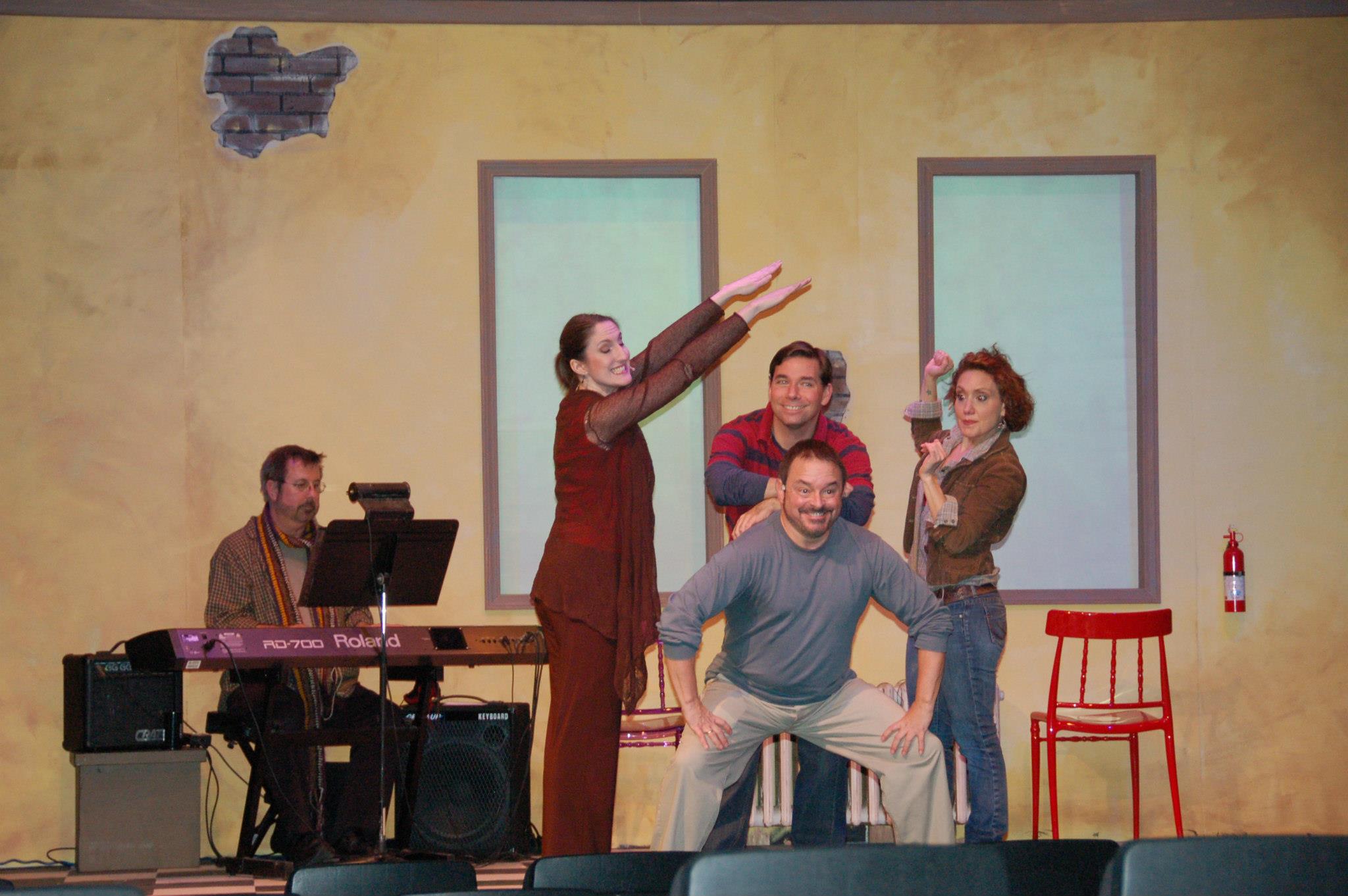 - the wonderful cast of [title of show] at Trustus in just about every moment on stage. Laurel Posey recounting her recurring lead role as "corporate whore," and Robin Gottlieb segueing from a cute number on secondary characters into Aerosmith were especially funny, but somehow the genuine moments in this little show touched me as few usually do. "Who says four chairs and a keyboard can’t make a musical? We’re enough with only that keyboard - we’re okay with only four chairs. We’ll be fine with only four chairs - we’ll rock hard with only four chairs!" That sort of do-it-yourself mentality and optimism can be applied to so many things in life, as can their conclusion that it's better to be "nine people's favorite thing, than a hundred people's ninth favorite thing." Score one vote for the rice crispy treats, as this was far and away my favorite show of the year.
- the wonderful cast of [title of show] at Trustus in just about every moment on stage. Laurel Posey recounting her recurring lead role as "corporate whore," and Robin Gottlieb segueing from a cute number on secondary characters into Aerosmith were especially funny, but somehow the genuine moments in this little show touched me as few usually do. "Who says four chairs and a keyboard can’t make a musical? We’re enough with only that keyboard - we’re okay with only four chairs. We’ll be fine with only four chairs - we’ll rock hard with only four chairs!" That sort of do-it-yourself mentality and optimism can be applied to so many things in life, as can their conclusion that it's better to be "nine people's favorite thing, than a hundred people's ninth favorite thing." Score one vote for the rice crispy treats, as this was far and away my favorite show of the year.
- the actual do-it-yourself production of Plan 9 from Outer Space - Live and Undead 2.0 presented at Trustus, but essentially cobbled together on a shoe-string six months earlier at Tapp's Art Center. Thanks to enlisting the aid of some of Columbia's finest actors, the show almost became a real play, even though the basic idea was to do a tongue-in-cheek spoof of what many feel is the worst movie ever made. So many of the cast were inspired in their campy re-imagining of the film's original dialogue, including Jennifer Mae Hill as a sexy stewardess (Hill was a gifted actress at Trustus, Chapin, and elsewhere long before she got into doll-making) and Chad Forrister as the stolid hero. Forrister was also the hero of 39 Steps above, and has perfected the mock-heroic, ever-so-slightly-exaggerated tone required by these spoofs. Victoria Wilson was beautiful as an evil alien, but used a

rich, serious, Shakespearean voice that reminded you of Judith Anderson or Maggie Smith. Some of Forrister's best moments came with Catherine Hunsinger, playing the soon-to-be-abducted heroine. There's an exercise in acting classes called "give and take," where two actors alternate allowing each other to take focus and dominate a scene. Hunsinger could have gotten some laughs as a stereotypical 1950's housewife, and given some to Forrister; instead, she wisely chose to downplay her performance, setting him up for vastly bigger laughs than either would have gotten separately. As I wrote in the review, "Another example of her generosity on stage comes when the zombie-fied Scott Means attacks her; she swoons melodramatically...but at the same time, falls over the actor's shoulder in a perfectly-timed movement, allowing him to lift her easily, with as much grace as two ballet dancers. Well, or pro wrestlers."
Hunsinger is a fearless performer, taking an emotionally demanding role in Spring Awakening the year before as the (semi-compliant) victim of a disturbing rape/seduction by the show's protagonist, yet somehow she managed to allow him to still seem deserving of the audience's sympathy. And then she tackled the Olivia Newton-John role in Grease (above) which is surely a daunting vocal challenge for the most talented of singers, but she filled Sandy's saddle oxfords with ease. That incredible voice had its biggest test in Plan 9, as Hunsinger's character was pursued across stage and into the house by zombies. The

original villains' make-up from the film was absurd enough, and here it was made even campier, yet Hunsinger chose to play the entire scene straight. As Chris Bickel cued some vintage movie chase-scene music and Hunsinger gamely screamed her head off, just for a moment I was no longer at Trustus. Just for a moment I was a 13-year-old watching the Mummy or the Wolfman or the Creature abduct some forgotten heroine on the Universal or Hammer Studios back lot. Just for a few seconds there was a genuine chill down my back, as a brave young actress fully committed to being a terrified damsel in distress, running for her life from unspeakable horror. Theatre is supposed to transport you, to take you out of yourself, and so this was for me, however briefly, the most memorable moment on stage in 2012.
So there are some of the things I enjoyed in the last year. How about you? That "comments" section below is there for a reason. What did you enjoy on stage in 2012?
~ August Krickel


